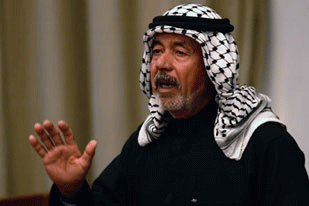
The demise of Saddam Hussein’s brutal regime took place over five years ago. Most of the card-carrying players in the American liberation deck have been found, including the literal ace in the hole, Saddam. In a trial so lengthy and full of delays that it has dropped almost entirely out of sight in the media, the next sacrificial wolf is the man dubbed “Chemical Ali” in the West. Lacking remorse, this chemical engineer of mass killing is well aware there is nothing he can do to stop his own death. But it ain’t over until the fat lady sings and the noose tightens. If the story of Chemical Ali has faded from your memory, here is a refresher from Al-Jazeera:
Ali Hassan al-Majid, Saddam Hussein’s cousin, and widely known as “Chemical Ali”, will be executed “in the coming days,” an Iraqi government spokesman has said.
Legal arguments and religious holidays have delayed al-Majid’s execution, which was confirmed on September 4 by the Iraqi supreme court and due to be implemented within 30 days.
Al-Majid was convicted earlier this year of presiding over the killing of thousands of Kurds during the Anfal campaign in the 1980s.
Asked whether he would be hanged soon, Ali al-Dabbagh said: “I think so, yes, in the coming days.”
Nuri al-Maliki, the prime minister, delayed the hanging of al-Majid until after the Muslim holiday of Eid al-Fitr, which ended on Monday.
Sultan Hashim Ahmad al-Tai, the former defence minister, and Hussein Rashid Mohammed, former deputy operations director of the Iraqi armed forces, were also sentenced to death for their part in the campaign.
All three were convicted of genocide, war crimes and crimes against humanity in June.
Guilty as charged: I have no reason to suspect that the volatile political persona of Chemical Ali is anything other than that depicted in horrific detail during the trial. But a trial is never just a trial, especially when it is meant to send a message to a wide variety of audiences. This one has taken a strange twist. There is a legal delay in carrying out the execution. Considering how badly botched the noose-coverage of Saddam’s fall was, this might not seem a surprise. But it is reported that President Jalal Talabani, and the vice-President Tareq al-Hashemi, have refused to sign the execution order. The issue stated is procedural: how should the Americans (who actually hold the condemned man) hand him over for the hanging? The desire to let justice take its course has been set aside over a turf war of who signs off on a done deal. Consider that Talabani is Kurdish and that the accused assisted in killing 100,000 Kurds in the 1988 Anfal campaign. Chemical Ali would disappear in a flash if he was set free on Kurdish territory, but in the Green Zone there is still a red light on his execution.
Now a lawyer sympathetic to Mr. Ali has thrown in a judicial time bomb.
Badie Aref, a lawyer who represented Saddam before he was hanged on December 30, 2006, said that al-Maliki’s committee had not convened yet and that any execution of al-Majid would now be illegal.
Badie said: “The committee … is useless because the constitution is clear and must not be misinterpreted.
“They have no right to implement the execution of Ali Hassan al-Majid after more than 30 days according to their own interpretation of the court’s law, to which they must be committed.”
I suspect that Chemical Ali will not be able to hang on very long, but the spectacle of his death is no longer just an issue of the justice that demands an eye for an eye, a tooth for a tooth, a hoodlum for a massive burial of ordinary men, women and children. Vengeance does not bring back the dead, although knocking off a killer does certainly prevent him from killing others. But no matter how soon this one man is laid to rest in his wooden coffin, the killing is not about to stop. Chemical Ali is about to bite the dust, but his dust has long since ceased to be the issue.